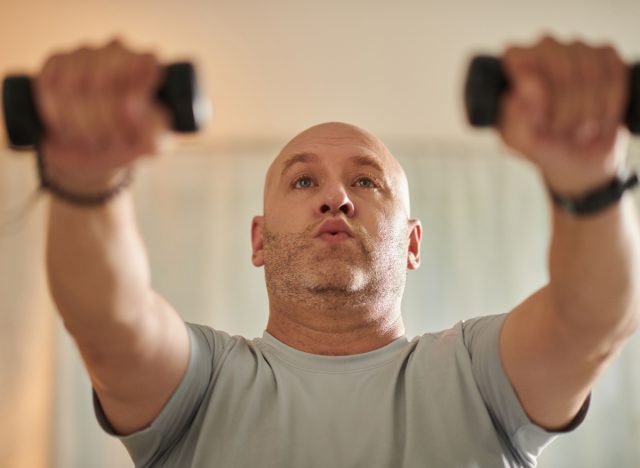[ad_1]
Turning 40 is a significant milestone. Just as your hobbies and interests evolve, so should your fitness routine. If you still hold onto the same workouts from your 20s, it’s time for a change. Your body deserves a regimen that caters to its current needs, helping you maintain strength, flexibility, and injury prevention. That’s why I’m breaking down exactly how to change your workout after 40 to optimize your time spent at the gym.
This stage of life isn’t about slowing down. It’s about working out smarter, not harder. By making a few key adjustments, you can continue to crush your fitness goals and feel amazing while doing it. This guide is your new fitness playbook for your 40s and beyond, promising a future of increased overall fitness and instilling a sense of drive and motivation.
In this article, I’ll dive into the specifics of how your body changes after 40, how to adapt your workouts accordingly, and how to create a well-balanced routine that keeps you at the top of your game.
How your body changes after 40:

As you enter your 40s, your body undergoes several changes that can affect your fitness routine.
Metabolism tends to slow down with age, making it easier to gain weight and more challenging to lose it. Muscle mass starts to decrease, leading to a reduction in strength and endurance. Additionally, joint health can become a concern, with cartilage wearing down and a higher likelihood of experiencing stiffness or discomfort.
Hormonal shifts, particularly in women, can also play a significant role. Decreased estrogen and testosterone levels can impact muscle mass, bone density, and energy levels. Recovery times may lengthen, making it essential to listen to your body and avoid overtraining.
Understanding these changes is the first step in tailoring a workout plan that aligns with your body’s evolving needs.
Here’s how to change your workouts after 40:

As you age, your body requires a different approach to exercise to maintain strength, flexibility, and overall health. Here’s how you can tailor your workouts after 40 to ensure you address critical areas of concern and optimize your fitness journey.
1. Increase strength training.
Building and maintaining muscle mass is crucial as you age. Incorporate weight lifting, resistance bands, or bodyweight exercises into your routine at least two to three times a week. Focus on compound movements like squats, deadlifts, and bench presses that engage multiple muscle groups.
2. Prioritize mobility work.
Flexibility and mobility can decline with age, so it’s crucial to include exercises that keep your joints moving freely. Incorporate dynamic stretches, yoga, or Pilates to improve the range of motion and prevent stiffness.
3. Perform balance exercises.
Balance decreases over time, increasing the risk of falls and injuries. Incorporate balance training into your routine with single-leg stands, stability ball exercises, and balance board drills. These moves can enhance proprioception and coordination.
4. Engage in cardio with care.
While cardiovascular exercise remains important, high-impact activities must be moderated to protect your joints, depending on your fitness level and past training history. The last thing you want is a nagging injury keeping you from accomplishing your fitness goals. Low-impact alternatives like swimming, cycling, or brisk walking can keep your heart healthy without added strain, especially for those newer to the workout scene.
Here’s how to curate a well-balanced workout after hitting 40:

Creating a well-rounded workout routine involves more than just hitting the gym a few times a week. It’s about combining strength, mobility, balance, and cardio to suit your lifestyle and fitness level, ensuring you address all aspects of your health and well-being.
Here’s a sample weekly plan to help you formulate a well-rounded fitness regimen that supports your goals and keeps you feeling strong and energized.
Monday:
- Strength training: Full-body workout with weights
- Mobility work: 10 minutes of dynamic stretching
Tuesday:
- Cardio: 30 minutes of low-impact activity (e.g., cycling or swimming)
- Balance exercises: A “balanced” dose of movement will work wonders here. Spend 15 minutes focusing on split squats, down dogs, and plank holds.
Wednesday:
- Strength training: Lower-body focus with squats, lunges, and deadlifts
- Flexibility: 15 minutes of yoga or Pilates
Thursday:
- Cardio: 30 minutes of moderate-intensity activity (e.g., brisk walking)
- Mobility: Foam rolling and stretching session
Friday:
- Strength training: Upper body workout with pushups, rows, and presses
- Balance exercises: Balanced-centric exercises like planks, single-leg holds, or bear crawls; accumulate 10 to 15 minutes of movement
Saturday:
- Active recovery: Gentle yoga, mindful movement, or a nature walk—the idea here is to move and aid recovery
Sunday:
- Rest or light activity: Leisurely walk or stretching
Jarrod Nobbe, MA, CSCS
[ad_2]
This article was originally published by a www.eatthis.com . Read the Original article here. .



